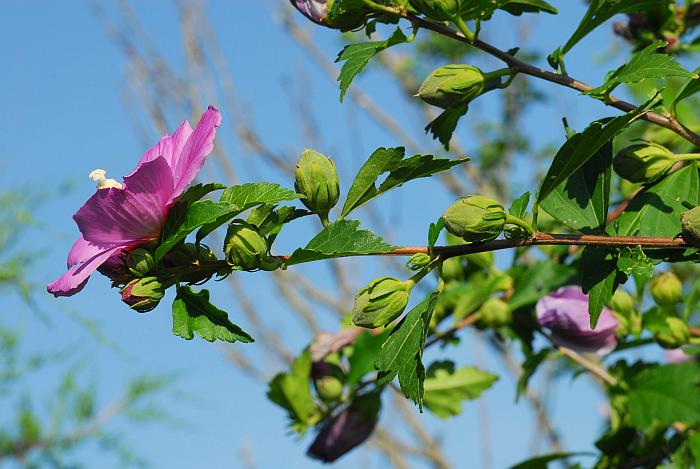Hibiscus syriacus L.
Rose Of Sharon

Introduced
CC = *
CW = 5
MOC = 19
© SRTurner
Hibiscus syriacus L.Rose Of Sharon | |
 |
Introduced CC = * CW = 5 MOC = 19 |
© SRTurner |
|
Family - Malvaceae Habit - Shrub or small tree. Stems - Stems to several m, ascending, branched, sparsely to moderately hairy when young, becoming glabrous with age. Twigs usually light brown. Leaves - Alternate, to 10 cm, ovate, mostly 3-lobed, the lobes sometimes lobed again, margins coarsely toothed or scalloped, usually glabrous. Stipules persistent.
Calyces - Subtended by 8-10 bractlets, these 8-18 mm long, linear, glabrous or finely pubescent with stellate hairs. Calyces 10-15 mm long at flowering, cup-shaped with sepals fused below the midpoint, the lobes triangular, finely pubescent with stellate hairs.
Flowers - Petals showy, to 5 cm, purple, pink, or white, usually with dark reddish bases. Stamens numerous, the staminal column circular in cross-section, with a low crown of teeth at the tip. Pistils with 5 locules, the carpels closely fused. Styles fused most of their length, the tube usually curved or bent obliquely upward at the tip, each branch with a globose or disc-shaped terminal stigma.
Fruits - Capsules, dehiscing longitudinally from the tip, to 2.5 cm, ovoid, beaked, hairy, yellow. Seeds 5-8 per locule, 4.0-4.5 mm long, broadly kidney-shaped or nearly circular, the surface minutely roughened or with a faint pattern of reticulate ridges, dark brown, glabrous, the margin densely pubescent with a line of orangish tan hairs
Flowering - July - September. Habitat - Streambanks, forests, roadsides, railroads, gardens. Origin - Native to Asia. Lookalikes - None. Other info. - This plant is often cultivated in landscapes and garden borders. It is hardy and produces numerous flowers over a long season, attracting insects and hummingbirds. Though an exotic species, it is reasonably well behaved, rarely escaping cultivation, though it can persist at old homesites for many years. The flower color is quite variable. Cultivars with doubled corollas exist. Photographs taken at Castlewood State Park, St. Louis County, MO, 8-9-2010, and near Labadie, Franklin County, MO, 7-31-2016, 9-6-2020, and 7-10-2022 (SRTurner). |